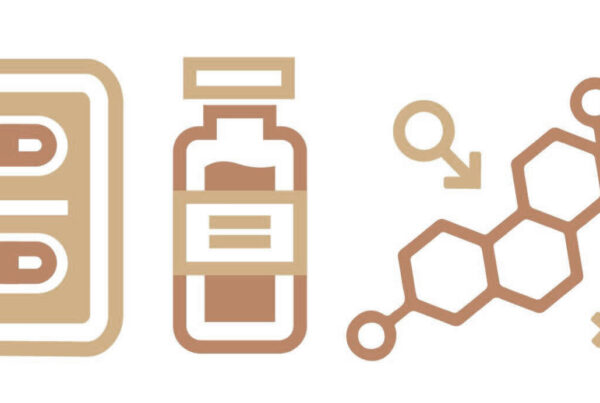While many women regard menopause with some apprehension or fear, it is a normal part of life – just like the onset of puberty. Knowing more about menopause and what to expect, is an important step in overcoming some of this anxiety. Menopause refers to the time during which a woman has her last menstrual period. Changes to the body occur both before and after menopause takes place. It is generally divided into three stages: perimenopause, menopause, and postmenopause.
Women will notice the first changes to their bodies during the perimenopause stage. Contrary to what some may believe, these earliest stages of the menopause process may occur as early as several years before a woman has her final menstrual period. It is during this time that the levels of estrogen and progesterone within a woman’s body begin to change, which can lead to numerous different symptoms such as mental fogginess or a lowered libido. Menopause itself follows, during which a woman’s menstrual periods will likely become irregular before halting altogether. After a woman has gone an entire year without a period, she can then say that she has been through menopause and that theperimenopause stage has been completed.
After these three stages, a woman is said to enter the postmenopause stage, which lasts the rest of her life. Though the average age for a woman going through the process of menopause is about 51 years old, this is no definite indicator of when a woman can expect to go through the process. Some experience menopause as early as their forties, while others will have it much later in their fifties.
There are some factors that can contribute to early menopause. Among these are lifestyle choices such as smoking. There are also various types of surgery that can lead to early menopause, such as the removal o the uterus through hysterectomy. However, while a woman’s periods may stop after a hysterectomy procedure, she may not have the typical menopausal symptoms, as the ovaries may still be functioning normally. If the ovaries are removed with the uterus, a woman will experience full menopause right away due to the loss of estrogen, but if the ovaries remain then she may experience menopausal symptoms later in life as the ovaries naturally cease production of these hormones.
Understanding the Symptoms of Menopause
The signs of menopause can vary greatly from woman to woman depending on a number of factors. It is important to remember that there are many different types of symptoms that may be present in a woman’s body, and they may appear at any time during the three stages of the menopause cycle. Most of the symptoms of menopause occur because of the reduction of estrogen in the body. Because so much of the body uses estrogen in its normal functions, there are many ways a woman’s body can be affected by its loss.
Menstrual Changes. For the majority of women, changes in the menstrual cycle will be the first indicator that the process of menopause is beginning. Irregular periods may become the norm, often becoming much shorter or last much longer than has been the case throughout most of the woman’s life. She may also notice that her bleeding is heavier or lighter than usual. While menstrual changes are normal during the menopausal process, there are some circumstances in which it is crucial that a woman contact a doctor. Seek help if:
Your periods are coming too closely together.
Your bleeding is excessively heavy.
You are experiencing an abnormal amount of spotting.
You are experiencing periods that last more than a week.
You have a period after a year without bleeding.
Hot Flashes. Hot flashes are among the most well known symptoms of menopause. They can occur early on in the process of going through menopause and may last for a few years after the end of menopause. Hot flashes are characterized by a sudden, intense sensation of heat in the body, often localized to the upper body. In addition to flushing in the face and neck, red blotches may appear on the skin, and women can find themselves experiencing heavy sweating or shivering. Often, hot flashes manifest themselves as night sweats. They can last anywhere between 30 seconds and ten minutes.
Vaginal and Bladder Health. Another of the more common symptoms of menopause is a feeling of dryness in the vaginal area, which can be problematic if it affects a woman’s ability to engage in sexual intercourse with her partner. However, there are also various other health problems that can arise, including vaginal and bladder infections. Incontinence, a lack of bladder control, may also be an issue for some women, who can find it difficult to hold in urine during exercise, or while sneezing or laughing.
Sleep. Even those women who have never had difficulties sleeping may suddenly experience insomnia during the onset of menopause. Whether they find it difficult to get to sleep, or they find that they wake too early, perhaps due to issues such as night sweats, getting a good night’s rest can be a particular challenge to the menopausal woman.
Sexual Changes. As mentioned, physical changes in the vaginal area such as dryness can lead to difficulties for women going through menopause. However, a woman’s libido can also be affected, both by hormones and by the psychological effects of going through the process of menopause. Some women find that they are uninterested in sex after going through menopause, while others find that being unable to get pregnant helps them to feel liberated and freer about sex. However, it is important for all women to remember that even after menopause they can still be at risk of contracting sexually transmitted diseases, and that protection in the form of condoms is still needed with new and untested partners, even if they can no longer get pregnant.
Changes in Mood. Perhaps the most difficult symptom of menopause for many women, and among the hardest to detect, is changes in mood related to the process. Women going through menopause may find themselves feeling moodier or more irritable during this time. There are no clear indicators as to why women experience these feelings, but it is likely to be due to a combination of factors as exhaustion and bodily changes as well as the natural stressors of middle age.
Changes in the Body. The body experiences many changes during the process of menopause. Many women notice widening at the waist, as well as a loss of muscle tone and an increase in body fat. Thinning of the skin may also occur, and joint and muscle pain may arise. Mentally, women may experience memory problems. Whether these changes are a result of the loss of estrogen, are a result of growing older, or are a combination of both is still unknown.
Heart and Bone Health During Menopause
In addition to the better known symptoms of menopause and the health issues that they present, it is also important that women be aware of the health of their heart and their bones during this process. Two major problems can present themselves during and after the process of menopause, and women must be aware of these issues in order to protect themselves.
Osteoporosis: Estrogen is a key component in helping to prevent bone loss. During and after menopause, the loss of estrogen can lead to complications as the body begins to lose more bone than is being replaced. This can lead to weakened bones that are easily broken, a condition known as osteoporosis. Women should be sure to speak to their doctors about having a bone density test to gauge their bone health and to find out if they are at risk for this disease. They should also take the time to speak to their doctors about ways that they can prevent osteoporosis or treat it if they are beginning to see symptoms.
Heart Disease: Both changes in estrogen levels as well as aging can lead to heart disease in menopausal and postmenopausal women. As women age, they may begin to gain weight or develop other issues such as high blood pressure, factors which can also contribute to heart disease. Women should be sure to pay close attention to their heart health during this time. In addition to keeping their blood pressure monitored, they should check their levels of triglycerides, fasting blood glucose, and LDL and HDL cholesterol on a regular basis. Women should also be sure to speak to their doctors about things that they can do to protect the health of their heart.





